Stop Worrying About What Others Think of You | A Complete Guide
“Care about what other people think and you will always be their prisoner.”
– Lao-Tze, ancient Chinese philosopher and writer
Most of us have been there: You are having an interesting conversation but hold back a comment. You are giving a presentation and are overwhelmed by your nervousness. You would like to ask someone out for a date, but you never get yourself to actually do it.
In all of these situations, your concerns about being judged or negatively evaluated have a huge adverse impact on your life. This raises the question: Is it bad to care about what others think of you?
It is natural to worry about the impression we make on others. It helps us get along, form healthy and satisfying relationships, and find a good job. However, when these concerns become excessive, they can have adverse effects. At this point, professional help and interventions may be warranted.

As you can see, you can worry too much about what others think of you, but also too little.
If you do not care at all about what others think, problems quickly follow: no friends, no job, no partner. Nobody wants to be around someone who is completely inconsiderate.
On the contrary, if you are overly concerned about the impression you make on others, you can also run into trouble. You may become excessively insecure in the presence of others and hide parts of yourself you fear are unacceptable.
In more severe cases, people may even avoid certain social situations altogether.
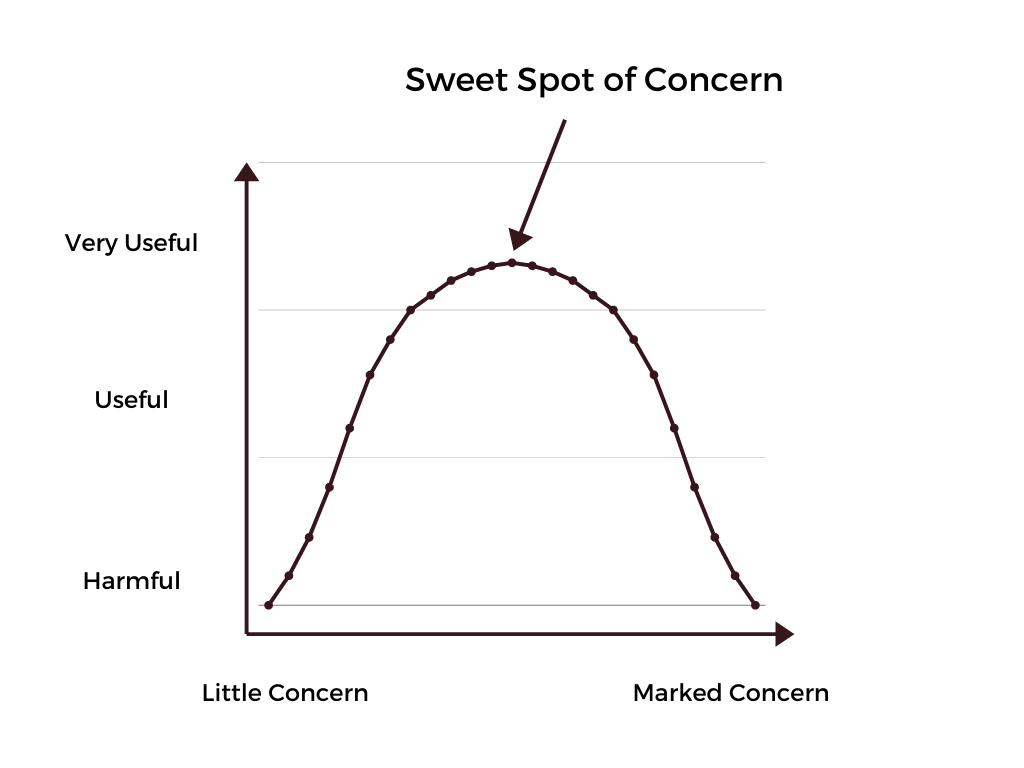
Being somewhat concerned about what others think of you is most helpful. It enables you to make decent impressions on others, while making you feel comfortable being yourself.
Here, we will break down the issue of being too concerned about what others think of you and show you what you can do about it.
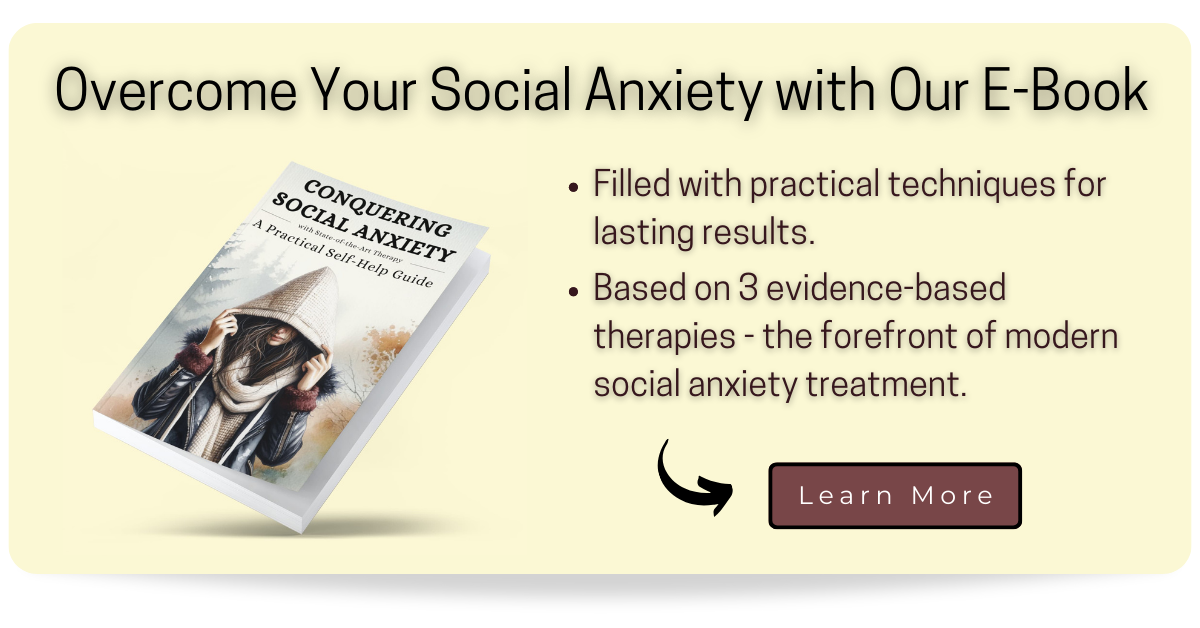
What does it mean when you care too much about what others think?
Caring too much about what others think means that you heavily rely on external approval. When you have a strong desire to generate a specific impression on others and simultaneously fear not being able to do so, you may feel insecure and experience anxiety in specific social settings.
People affected by this dilemma fall into the red category in the graphic below.
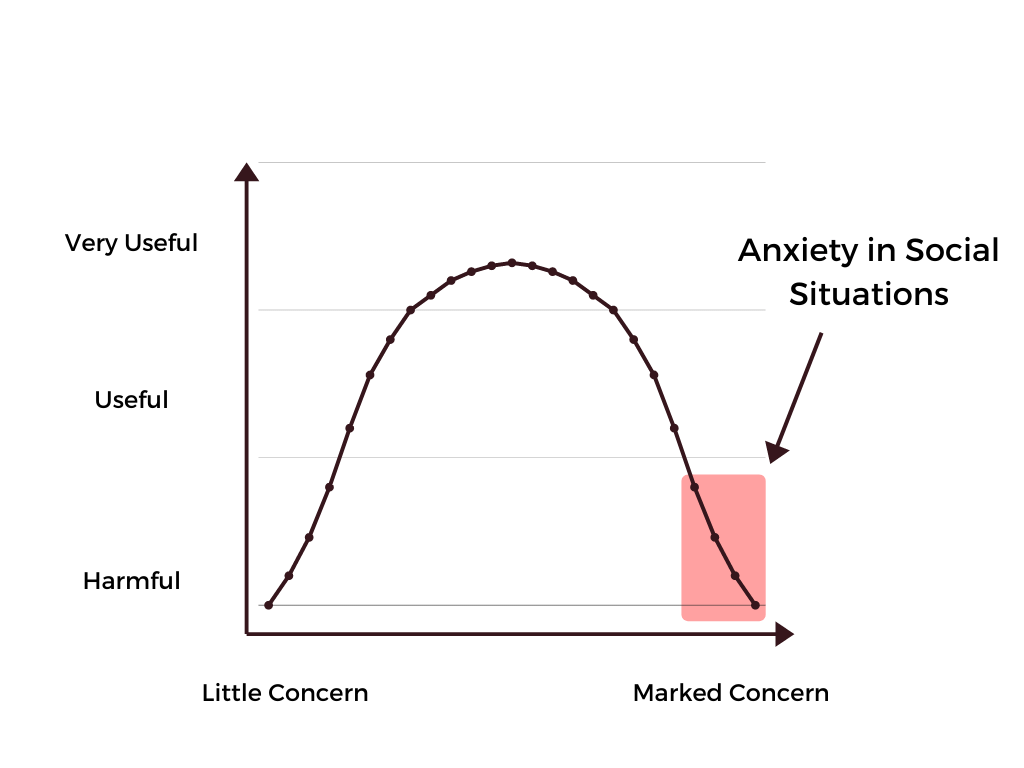
At this point, you may experience anxiety or fear before and during social situations.
Usually, the more you care about the opinion of those around you, the stronger your anxiety. This is especially the case when you have decreased confidence in being able to make a good impression.
For example, you may feel comfortable talking about politics with your friends, but experience anxiety when discussing them in a college class, where several people chose a major in this subject and know significantly more about it than you.
How Is This Fear Called?
Being overly concerned about what others think of you is referred to as social anxiety. In its more severe version, we speak of social anxiety disorder (formerly social phobia), a mental health condition. It describes the excessive fear of being judged, rejected, or negatively evaluated.
Social anxiety disorder (SAD) is surprisingly common. About 12% of people suffer from it at some point in their lives (Kessler et al., 2005).
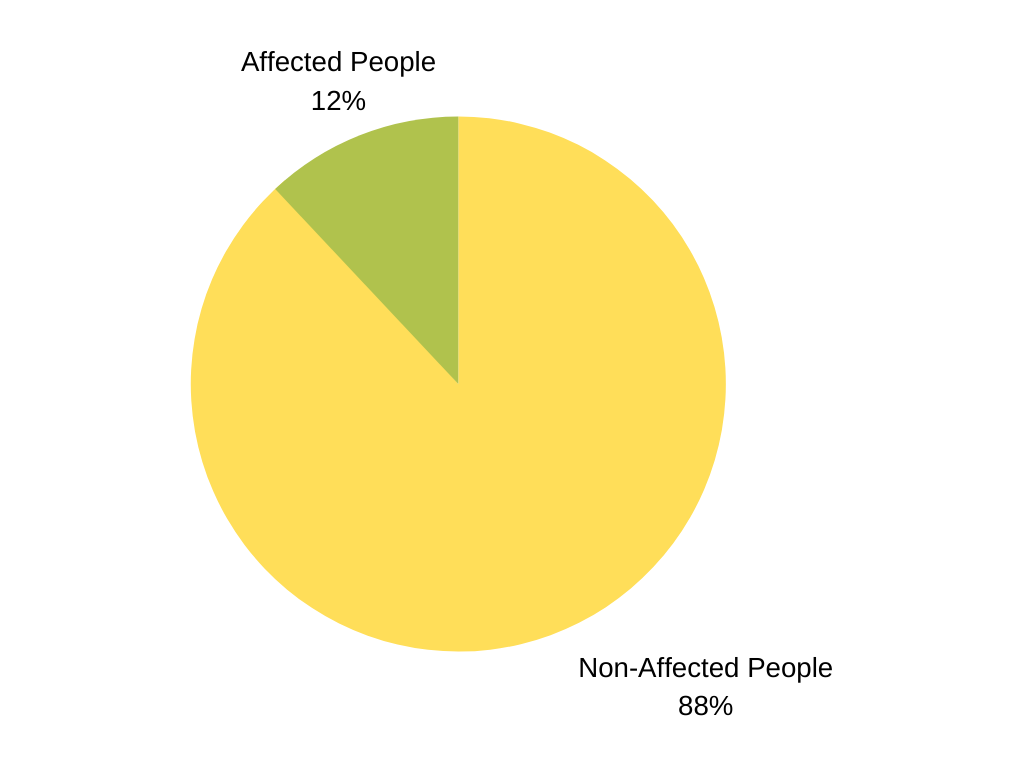
Affected people experience severe distress when facing the feared social situations and they often avoid them altogether.
The effects of the disorder can be detrimental. Most people avoid living up to their full professional and interpersonal potential and many develop depression as a result.
When the fear of being negatively evaluated has become this strong, professional help is warranted.
However, these 12% only represent the more severe cases. Your social fears may be significant, but you do not reach the diagnostic threshold.
With so many people worrying excessively about what others think of them, you may wonder: Why is that? What causes you and so many others to struggle with this?

Why are you so concerned about what others think of you?
As we have already pointed out, humans have a natural tendency to care about what others think.
When these concerns become excessive and people start to suffer because of it, we should identify the origins of the problem.
However, the exact root causes of psychological phenomena are not easily tracked down. Typically, our psychological makeup is the result of a combination of many different influences.
Yet, scientists from around the globe have been able to identify several possible causes of social anxiety.

Extensive research has revealed that the following factors can predispose a person to be overly concerned about what others think of them:
- Genetics (Relatives with Social Anxiety)
- Insecure Attachment Style (Basic Fear or Uncertainty in Close Relationships)
- Parents’ Shortcomings (Critical, Rejecting, Shaming, Overprotective)
- Traumatic Social Experiences (Direct Conditioning)
- Witnessing Other’s Traumatic Social Experiences (Vicarious Conditioning)
- Significant Negative Life Events (Depressed Parent, Being Abused, Frequent Moves During Childhood, Family Conflict, etc.)
- Social Skills Deficit (Sometimes Because of Social Isolation During Childhood)
- Cognitive Biases (Unfavorable Ways of Thinking)
- Biological Vulnerabilities (Alterations in Brain Structure)
- Cultural Influences (Western: Embraces Self-Confidence; Eastern: Embraces Social Discretion)
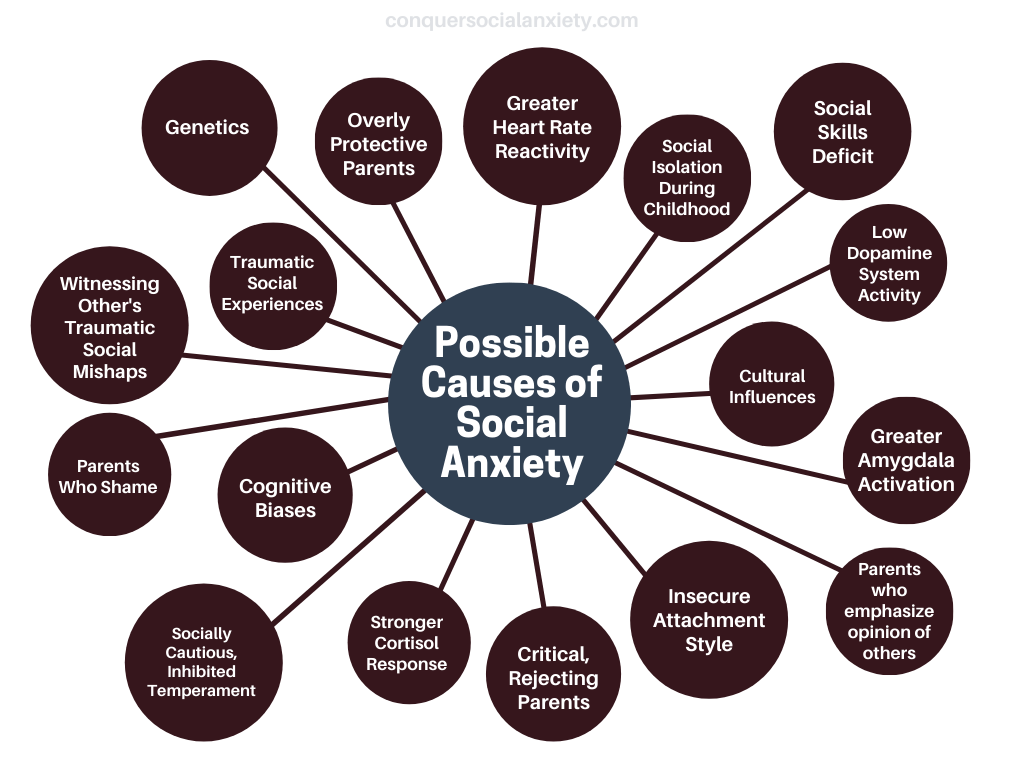
As you can see, excessive concerns about what others think can be caused by a wild mix of several predisposing factors.
Usually, social anxiety is not the result of one single root cause, but rather of a combination of various of these influences. For a more in-depth view, see our article on the causes of social anxiety disorder.
How do you stop worrying about what others think of you?
The coaching scene likes to come up with quick-fixes that can help you overcome these concerns. While these recommendations are usually not backed up by clinical trials, they may be helpful to some people.
We have hand-picked the best hacks out there – some that actually have the potential to be of real help.
Let’s have a quick look at them before moving on to psychotherapy, which applies a more science-backed, down to earth approach and is more suitable for those who struggle with excessive worrying.
5 Quick Psychological Hacks
Focus on Your Principles, Your Purpose & Intentions
Whenever you find yourself worrying about what others may be thinking of you, bring your attention to to your “why”.
- Why are you giving this presentation? Maybe it’s because you care about sharing a message.
- Why are you going on this date? Maybe it’s because you are genuinely interested in the other person.
- Why are you in this meeting? Maybe it’s because your boss and colleagues value your honest, professional opinion.

Knowing why you are in a given situation can not only boost your motivation to embrace the discomfort of insecurity, but it can also make you more resistent to other people’s judgments.
Connect with your purpose and you may uncover hidden resilience.
Understand & Remind Yourself of How Little Most People Care
Many people overestimate the degree to which their actions and their appearance matter to others. In reality, most of us are mainly preoccupied with ourselves and pay little attention to other people’s shortcomings.
In fact, human beings evolved to be somewhat concerned about how they come across. When you are with others, it is likely that most of them worry about the impression they are generating on others, just as you do.

“You wouldn’t worry so much about what others think of you if you realized how seldom they do.”
– Eleanor Roosevelt
Reminding yourself of this human tendency does not only help you connect to others, but it can help you feel more at ease around them.
Seek Feedback from the Right People
Many times, we are concerned about what random people, often even complete strangers, may think of us.
You drop something in the grocery store and others are turning to see what happened. Does it really matter if these people think you are a fool?
Firstly, they probably do not think as harshly about you as you may think. Secondly, they base their judgment of you on a single situation.
This means: Their judgment is always going to be inaccurate. Why worry about it too much?
The same accounts for all the people who do not know the real you.
Of course, there are a couple of people whose thoughts about you really do matter a little more: loving and accepting friends, your spouse, your children, or your parents.

If you want some honest feedback, people who really know you and who are not of the judgmental type are the ones to reach out to.
Keep in Mind That You Have a Biased View
As already mentioned, we evolved to be concerned about what others think of us.
People who were indifferent to the opinions of others were quickly excluded from the tribe and could not pass on their genes to the next generation.
This means that we are the descendants of people who were smart enough to make decent impressions on each other, as this allowed them to survive and reproduce.
Our brains are hardwired to do this, as this maximizes the chances of survival of our species. Therefore, we have a slight negativity bias when it comes to social approval.

From the brain’s point of view, it is better to constantly be on the lookout and ring some false alarms than to miss important social cues that could warn us of being potentially judged and rejected.
Being overly confident in our own likeability was (and mostly still is) a bad strategy.
When you find yourself feeling insecure and think people are judging you, remind yourself that more often than not your brain is ringing false alarms.
Keep the Right Company
If you experience these concerns only when you are around specific people, this may be reason to pay closer attention to your feelings.
Sometimes, it is possible to interpret psychological symptoms as small hints that something is off and we need to readjust our course.
Maybe the relationship with this person is not healthy or the other person is very judgmental.

Of course, in life we cannot always choose our company and we all have to deal with difficult people.
However, we can choose our friends and who we spend time with (outside of work and family reunions).
If you tend to feel uncomfortable when you are around judgmental people, it may be a valid option to consider detaching from them.
Here are these five tips summed up again. Next, we will have a look on strategies from psychotherapy.
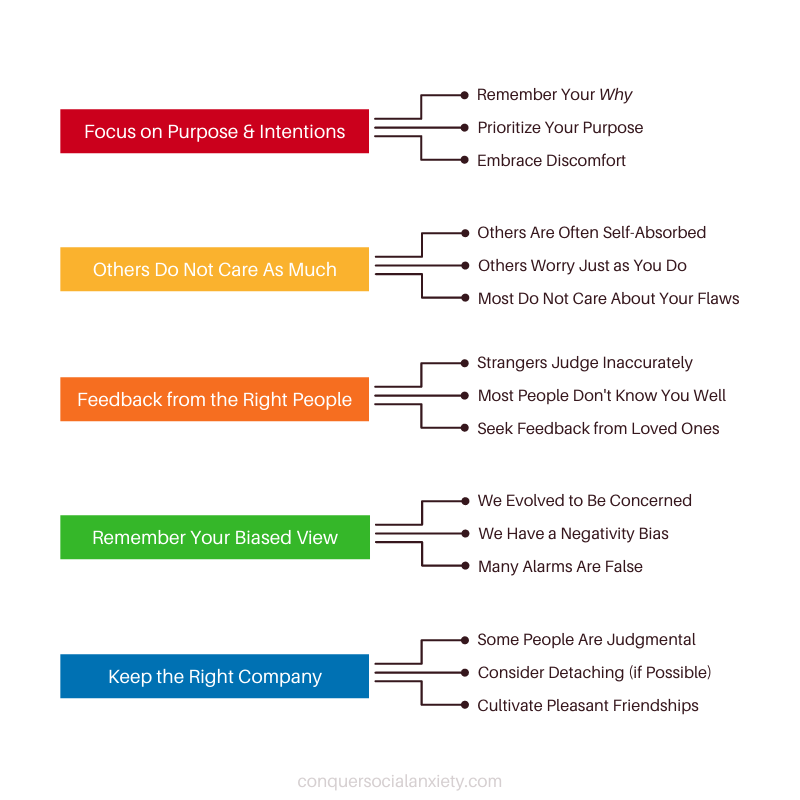

Strategies from Psychotherapy
While the above tips can help, their effectiveness is limited if you struggle with excessive concerns about being negatively evaluated.
As we mentioned above, people who fall into this category may suffer from social anxiety disorder. Affected people experience intense fear or anxiety in social situations and often avoid them as a result.
At this point, we speak of a mental health condition. It is usually not fixed by applying a few psychological hacks and it needs to be taken seriously.
There are several psychotherapies that have been proven effective in treating social anxiety. See the following graphic for a general overview.
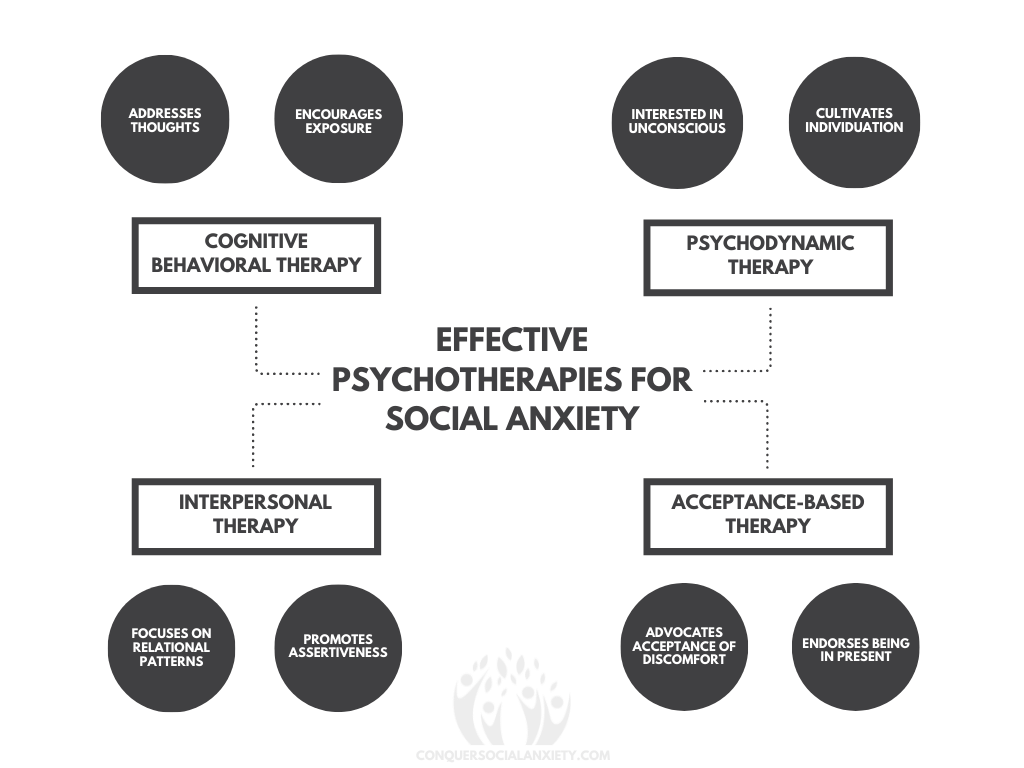
Let’s have a quick look at how each of these therapies addresses a severe preoccupation with how you are perceived by others.
Cognitive Behavioral Therapy (CBT)
The main premise of CBT is that the way we think and act determines how we feel. By changing our thoughts and our behavior, we can reduce negative emotions, such as anxiety.
“People are not disturbed by things, but by the view they take of them.“
– Epictetus, Greek Stoic philosopher
CBT emphasizes the importance of past negative social experiences, which trigger negative thoughts when similar situations arise.

For example, a person may have been laughed at when giving a presentation at school. Years later, when giving a presentation at work, she may have the following thoughts pop up in her mind:
- “I will make a fool of myself when reading the meeting outline.”
- “They will notice how nervous I am and make fun of me.”
- “No one will respect me anymore and my boss will think I am incompetent.”
Thoughts of this type are believed to fuel self-consciousness, anxiety symptoms and attempts to avoid worst case scenarios.
In turn, these components are believed to feed of each other, increasing the person’s social anxiety even further. This vicious cycle is addressed in CBT treatment.
Additionally, the person is encouraged to seek gradual exposure to the feared situations, which typically leads to large treatment gains.
CBT tries to break this self-reinforcing anxiety loop by:
- Changing negative thoughts to more realistic ones and encouraging not to give in to intrusive thoughts.
- Training the ability to direct the attention away from internal stimuli (such as the physiological sensations of anxiety) and towards the task at hand (such as a conversation).
- Encouraging gradual exposure to the feared social situations. By facing these scenarios repeatedly, anxiety usually declines quite quickly.
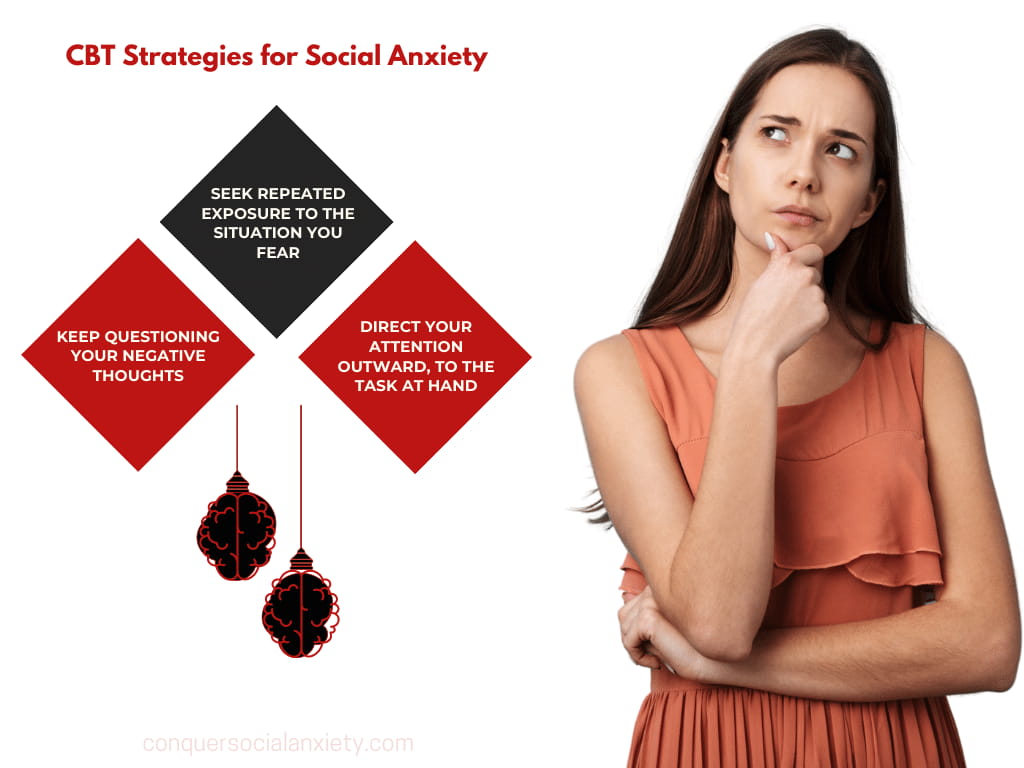
Practical Takeaways from cognitive behavioral therapy:
- Many of your thoughts are inaccurate. Keep that in mind when you find yourself worrying about a future situation or ruminating about a past event. Continually question your negative thoughts about yourself, others, and specific social situations.
- When you find yourself particularly concerned about how you are perceived by others, direct your attention towards the task at hand (a conversation, giving a presentation, etc.). Focusing on your concerns is often counterproductive.
- If you avoid saying or doing certain things out of the fear of being judged, be aware that this avoidance tends to maintain your concerns. You can break this cycle by proactively doing what you have been avoiding.
Psychodynamic Therapy
Dynamic psychotherapy is interested in the underlying, often unconscious emotional conflicts associated with social anxiety.
For example, a common theme in socially anxious people is the desire to be liked and admired, paired with a belief that this admiration is undeserved (Hoffman, 2018, p. 7).
Among the main differences in comparison to other approaches is the focus on early childhood experiences, especially the relationship to parents and early caregivers, and how these affect the patient’s experiences in the present.
One of the main developmental struggles for people with social anxiety seems to be reaching an authentic self – an own identity which has its own opinions, aware of its needs and wishes and is able to give voice to them in interaction with others (McEvoy, O’Connor, & McCarthy, 2016).

Unraveling unconscious emotional conflicts and cultivating the development of the patient’s true self are the main components in treatment.
Here are some practical takeaways from psychodynamic therapy:
- Instead of constantly asking yourself what others may think, feel, need or want, do the same thing for yourself. What is your opinion on a specific topic? What would you like to do with your life? What do you need today?
- Be more authentic with others and communicate these essential parts of yourself when appropriate. With time, you will grow more independent of other people’s opinions.
- Sometimes, unconscious conflicts can cause social insecurity. Consider uncovering these underlying reasons together with a psychodynamic therapist.
Interpersonal Therapy
This therapeutic approach primarily focuses on problematic ways of relating to others. Similarly to dynamic therapy, it emphasizes the importance of our relational behavior for the development of psychological symptoms.
Likewise, it highlights the importance of confronting major life challenges in a successful manner.
For example, social anxiety often emerges when a person is having difficulties adapting to new situations and difficult life circumstances (Lipsitz, 2012).
Romantic breakups, leaving high school and going to college, receiving a promotion, or the death of a loved one are all common triggers for feelings of insecurity around other people.

In therapy, the individual builds up strength and learns how to respond in a more adaptive way, which often leads to symptomatic relief.
In terms of interpersonal behavior, the socially anxious patient usually needs to become more assertive and learn how to communicate their anger and discontent.
Suppressed anger is one of the main reason why you may feel insecure and anxious around other people, especially if you tend to worry about how you are perceived (Sulz, 2013).
Some practical takeaways from interpersonal therapy:
- Communication is king. Be more open and transparent about what you want and do not want in your relationships.
- Anger can and should be communicated in an effective, appropriate manner. Suppressing it often causes anxiety. Therefore, focus on improving your assertiveness.
- If you recently experienced a significant change of life circumstances, ask yourself how you have responded and if there is anything that can help you adapt more effectively.
Acceptance-Based Therapy
There are several therapies based on psychological acceptance. Their main idea is that our attempts to avoid uncomfortable thoughts and feelings are not only counterproductive, but also detrimental.
If you are markedly concerned about how others perceive you, you have probably fallen prey to these attempts.
Instead of challenging uncomfortable feelings and thoughts, acceptance-based approaches teach psychological acceptance of these phenomena.

Like this, you bypass the ironic thought process – a psychological phenomenon which paradoxically intensifies a thought or sensation when the person actively tries to suppress it.
“Try to pose for yourself this task: not to think of a polar bear, and you will see that cursed thing come to mind every minute.”
– Fyodor Dostoevsky, Winter Notes on Summer Impressions, 1863
Mindfulness meditation teaches your brain how to do this, even in stressful situations. If you regularly sit down to meditate, you will get better at accepting intrusive thoughts and uncomfortable sensations.
Like this, you can be fully present in social situations and not get caught up in negative streams of thought. This not only improves your social performance, but also makes you more resilient to possible judgment and negative evaluation.

Here are some important takeaways from acceptance-based therapy:
- Do not try to suppress uncomfortable thoughts or feelings. Especially when you are under stress, this tends to intensify them.
- Sit down and meditate regularly, even if it is just for 5 minutes a day. Like this, you learn how to accept uncomfortable thoughts and feelings.
- When you feel insecure around others, direct your attention to the present moment. Whenever you find yourself worrying about what others may be thinking, acknowledge it and simply come back to what is actually happening.
Concluding Remarks
The recommendations highlighted in this article are likely to help you care less about what others think of you.
However, in order to experience significant improvements, these interventions need to be practiced regularly and over an extended period.
If you excessively worry about how you come across and feel these concerns hold you back from living your life, you should consider working with a therapist.
Left untreated, social anxiety disorder tends to persist and often leads to additional problems, such as depression and alcohol abuse.
For a complete overview of available therapy options, see our full treatment guide for social anxiety.


Pin | Share | Follow
[DISPLAY_ULTIMATE_SOCIAL_ICONS]Hoffman, T. The Psychodynamics of Performance Anxiety: Psychoanalytic Psychotherapy in the Treatment of Social Phobia/Social Anxiety Disorder. J Contemp Psychother 49, 153–160 (2019). https://doi.org/10.1007/s10879-018-9411-1
Kessler, R. C., Berglund, P., Demler, O., Jin, R., Merikangas, K. R., & Walters, E. E. (2005). Lifetime prevalence and age-of-onset distributions of DSM-IV disorders in the National Comorbidity Survey Replication. Archives of general psychiatry, 62(6), 593–602. https://doi.org/10.1001/archpsyc.62.6.593
Lipsitz, J. D. (2012). Interpersonal psychotherapy for social anxiety disorder. In J. C. Markowitz & M. M. Weissman (Eds.), Casebook of interpersonal psychotherapy (p. 169–184). Oxford University Press. https://doi.org/10.1093/med:psych/9780199746903.003.0010
McEvoy, B., O’Connor, J., & McCarthy, O. (2016). Behind the Mask: A Psychodynamic Exploration of the Experiences of Individuals Diagnosed with Social Anxiety Disorder. Psychodynamic psychiatry, 44(4), 541–565. https://doi.org/10.1521/pdps.2016.44.4.541

About the Author: Martin Stork
Martin is a professional psychologist with a background in physical therapy. He has organized and led various support groups for people with social anxiety in Washington, DC and Buenos Aires, Argentina. He is the founder of Conquer Social Anxiety Ltd, where he operates as a writer, therapist and director. You can click here to find out more about Martin.










